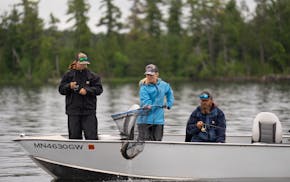In Minnesota, if you're a poacher — meaning if you intentionally kill wildlife without a license or by other illegal means — should you go to jail?
A lot of legal hunters think so. So do a lot of conservation officers, who sometimes spend years gathering evidence on bad guys, only to see the miscreants go to court, pay a fine and get back to doing what they do.
Which brings us to the recent case of Brady Tyler Harth, 30, of Hinckley.
Harth came to the attention of Department of Natural Resources conservation officers in January 2024, when they got a tip he was trapping illegally.
Court documents say DNR investigators searched Harth's social media accounts and found he bragged about killing a black bear, a gray wolf and a "large" buck.
But Harth didn't hold licenses for hunting deer and bear at the time the animals were killed, the DNR said. And gray wolves are protected by federal law.
Charged with three gross misdemeanors and two misdemeanors, Harth pleaded guilty last month to one charge of each, the former for transporting illegal big game, the latter for failure to register big game.
His penalty?
Two years probation, $1,400 in restitution, forfeiture of his ATV, bow and hunting rifle, and loss of hunting and fishing privileges in Minnesota and most other states for three years.
What, you say, no jail time?
Not even for intentionally, and repeatedly, stealing public resources and bragging about it?
Not in Minnesota, it turns out. And not in most states. Because we — all of us — still view poaching and other crimes against wildlife and their habitats as not real crimes.
More like kind-of crimes.
Sure, Troy Alan Reinke was sentenced to a year in jail in 2010 when, at 32 and living in Cannon Falls, he pleaded guilty to, among other charges, possessing a world-record 8-point buck.
DNR investigators believed — but couldn't prove — Reinke shot the buck illegally with a gun. But they could prove he possessed the animal and that he illegally killed two other deer with a bow.
Reinke got tossed in the slammer not only for his wildlife crimes, but because he was on parole for domestic assault when he was convicted of the deer charges.
A better example of a poacher who dodged time in the hoosegow is William R. Welsh.
Welsh's illegal hunting was the "most extensive poaching activity in the history of Sherburne National Wildlife Refuge," the U.S. Fish and Wildlife Service said in 2014.
The case began in 2011, when Welsh, 41 at the time and living in Waite Park, admitted to federal and state wildlife investigators that he shot and killed a buck illegally on the refuge, before returning the next day to cut off its antlers.
That animal was one of more than a half-dozen deer Welsh killed on a closed portion of the refuge between 2006 and 2011, investigators determined. On at least one occasion he brought his 11-year-old son with him.
Welsh was already well known to the DNR by the time the feds got to him. Conservation officers in 1996 cited him for illegally hunting deer on a state game refuge. Though that cost him his hunting privileges for three years, he later admitted he used his wife's license to register a deer he killed while his license was revoked.
Surely a career poacher like Welsh who showed no respect for the law — or wildlife — would see jail time. This wasn't a hunter, after all, who forgot his license at home, or who mistakenly shot the wrong duck, or mis-measured a walleye.
Those offenses are small potatoes, happen all the time and bear little or no consequence for wildlife or conservation.
Welsh, on the other hand, was an inveterate stealer of public property. His actions were an insult to legal hunters, whose goal is to maintain and, when possible, increase game and other wildlife populations through habitat management and regulated harvest.
Welsh got two years probation, 100 hours of community service and (let's try this one more time) a loss of hunting privileges for five years.
But no jail time.
Why not?
Because going easy on poachers is an American tradition.
Most of the first Europeans who settled here believed their new home was populated by endless numbers of deer, birds and other critters. For generations, they took what they wanted, when they wanted.
Even in the early 1900s, when fewer than 100 wild buffalo were left on the Great Plains, and when Martha, the last known passenger pigeon, died in the Cincinnati Zoo, many Americans still believed their nation's bounty was limitless.
Or — the modern version thereof — they simply didn't care.
Is one answer to this widespread indifference to insist that all poachers go to jail?
Maybe.
But perhaps there's a better way.
Some years ago, I spent a lot of time with the late Dave Hall, a U.S. fish and Wildlife Service special agent whose work was the subject of a great book by Marc Reisner titled, "Game Wars, the Undercover Pursuit of Wildlife Poachers."
Hall, of Slidell, La., believed organized criminals who traded in wildlife for profit should be sent to prison. But run-of-the-mill poachers were oftentimes cats of a different stripe, he said.
"Ironically, these guys in many cases are the best shots, the most effective duck and goose callers, or the best fishermen," he said. "They just didn't know anything about conservation, or why they should be law- abiding in the field."
Putting these poachers in jail had little chance of converting them to legal hunters, Hall believed.
So he convinced judges to sentence these law breakers to his "Poachers to Preachers" program, in which convicted poachers were required to learn about conservation and appear at sportsmen's banquets, in schools and before other groups to talk about their offenses, why they were wrong and why people shouldn't do what they did.
"Some of the worst poachers became the best preachers," Hall said.
Something for Minnesota prosecutors and judges to think about the next time they consider punishment for someone who hunts illegally in a national wildlife refuge — or who kills a deer or a bear without a license and brags about it online.
Anderson: He paddled solo into the BWCAW and didn't come back

Anderson: In early June, Minnesota fish are begging to be caught. Won't you help?

